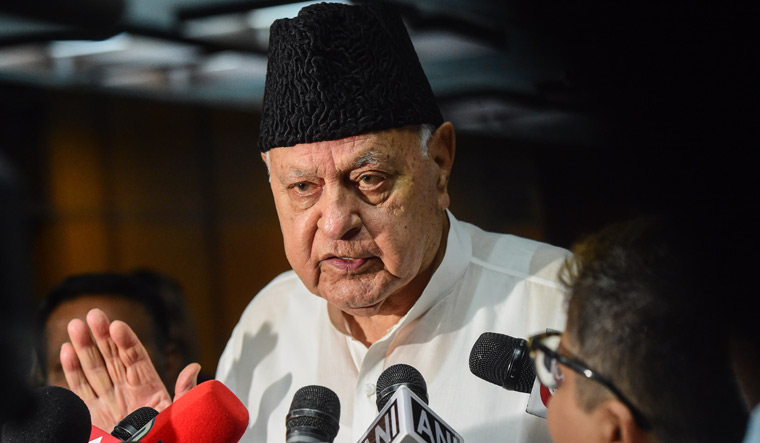- Won’t be delivering military equipment or transfer security-related funds to Pakistan: US State Deptt
- US action has nothing to do with Islamabad not acting against JuD chief Hafiz Saeed
- We fought war on terror on own resources: FO
The US has suspended more than USD 1.15 billion security assistance to Pakistan, accusing Islamabad of harboring terror groups like the Afghan Taliban and the Haqqani Network within its border and showing unwillingness to take “decisive actions” against them.
The freezing of all security assistance to Pakistan comes days after President Donald Trump in a new year tweet accused Pakistan of giving nothing to the US but “lies and deceit” and providing “safe haven” to terrorists in return for USD 33 billion aid over the last 15 years.
Prominent among the suspended amount include USD 255 million in Foreign Military Funding (FMF) for the fiscal year 2016 as mandated by the Congress.
In addition, the Department of Defense has suspended the entire USD 900 million of the Coalition Support Fund (CSF) money to Pakistan for the fiscal year 2017.
“Today we can confirm that we are suspending national security assistance only, to Pakistan at this time until the Pakistani government takes decisive action against groups, including the Afghan Taliban and the Haqqani Network. We consider them to be destabilising the region and also targeting US personnel. The US will suspend that kind of security assistance to Pakistan,” State Department Spokesperson Heather Nauert told reporters.
The US, she said, will not be delivering military equipment or transfer security-related funds to Pakistan unless it is required by law.
Referring to the new South Asia Policy announced by Trump in August, Nauert said despite a sustained high-level engagement by this administration with the government of Pakistan, the Taliban and the Haqqani Network continue to find sanctuary inside Pakistan as they plot to destabilise Afghanistan and also attack the US and allied personnel.
Department of Defense Spokesperson Lt Col Mike Andrews told PTI that National Defense Authorisation Act 2017 provides up to USD 900 million for Pakistan in CSF.
Of these funds, USD 400 million can only be released if the Secretary of Defense Jim Mattis certifies that the Pakistan government has taken specific actions against the Haqqani Network.
“At this stage all Fiscal Year 17 CSF have been suspended, so that’s the entire amount of USD 900 million,” Andrews said.
During an interaction with Pentagon reporters, Defense Secretary Jim Mattis did not respond to question if he was in favour of cutting off the aid to Pakistan.
“I prefer not to address that right now because it’s obviously still being formulated as policy. But I’ll give my advice on it to the president. I also agree on some confidentiality there,” he said.
According to a senior State Department official, no decision has been taken on the fate of USD 255 million security assistance to Pakistan for the fiscal year 2017.
The deadline for that is September 30 this year.
Mattis along with the Secretary of State Rex Tillerson have travelled to Pakistan in recent months to deliver tough message to their leadership. So, this action should not come as a surprise to them, Nauert said.
“They may say it’s a surprise, but what is no surprise is that the President has expressed his concerns, Secretary Tillerson has expressed his concerns, as has Secretary Mattis, and I imagine many other government officials having those conversations with Pakistan,” Nauert said.
Now, the money that has been suspended at this time does not mean that it will be suspended forever, she said.
“Pakistan has the ability to get this money back, in the future, but they have to take decisive action. They have to take decisive steps,” she added.
“People have long asked, why don’t you do more about Pakistan, and I think this sort of answers that question. Obviously, Pakistan is important, an important relationship to the US, because together we can work hard to combat terrorism. Perhaps no other country has suffered more from terrorism than Pakistan and many other countries in that part of the region,” she said.
“They understand that, but still they aren’t taking the steps that they need to take in order to fight terrorism,” she said.
Historically, the US has provided Pakistan over USD 1 billion in security assistance annually.
Referring to Trump’s new strategy, Nauert said despite a sustained high-level engagement by Trump administration with the government of Pakistan, the Taliban and the Haqqani Network continue to find sanctuary inside Pakistan as they plot to destabilise Afghanistan and also attack the US and allied personnel.
At the same time, Nauert made it clear that the US action has nothing to do with Pakistan not taking action against the alleged Mumbai attack mastermind and JuD chief Hafiz Saeed.
“We have certainly expressed our concern about the mastermind of the 2008 Mumbai attacks being let out of house arrest in Pakistan. To my knowledge, that has nothing to do with that,” she said in response to a question on Saeed, who was released by Pakistan on November last year.
“There is a USD 10 million reward out for information leading to his re-arrest, the person who is the mastermind of the Mumbai attacks who was let go in Pakistan,” Nauert said.
In an interaction with reporters, two senior state department officials insisted that such a move is not a punishment, but to provide an “incentive” to Pakistan to take more action against terrorist groups.
“We have not done anything that’s irreversible here. All this funding is available to Pakistan, if they undertake to take the measures that we’ve asked of them,” one official said.
“So we were hoping that this is an incentive that they don’t want to see this relationship deteriorate any further..,” he added.
The US have long complained that Pakistan offered safe haven to the Afghan Taliban and their allies, the Haqqani Network, allowing them to carry out cross-border attacks in Afghanistan. Pakistan denies allegations but President Trump has escalated the criticism against the country since he took office last January.
Yesterday, US Secretary of State Rex Tillerson had placed Pakistan on a special watch list for severe violations of religious freedom.
The US failed to behave as an ally and turned Islamabad into a “whipping boy” for its own shortcomings in Afghanistan, Pakistan’s foreign minister Khwaja Asif said, after the Trump administration suspended security-related aid to the country.
“We do not have any alliance with the United States,” Asif told Wall Street Journal in an interview today.
“This is not how allies behave,” he said.
Asif said Pakistan’s recent counter-terrorism operations—including those in the tribal areas that border Afghanistan—has cleared the country of both the organized presence of militants and areas where they might seek sanctuary as peace returns.
“But Taliban fighters still slip through and meld into its large Afghan refugee population,” he said.
There are 1.4 million such refugees currently living in Pakistan, according to the United Nations.
“We have relative calm in Pakistan at the moment. But if we go against these people [Afghan insurgents], then the war will again be fought on our soil, which will suit the Americans,” Asif said.
After Pakistan joined the US war on terror in 2001, some jihadist groups turned on Islamabad—a campaign of violence that has taken thousands of lives. Deaths from domestic terror attacks have declined over the past few years, after Pakistan launched anti-terror operations.
Asif said a lack of cooperation from Washington and Kabul on both returning refugees to Afghanistan and fencing the border between the two countries raises the suspicion that the intent to fight terror together is not sincere.
He said there are other countries that could ally with Pakistan.
Last year, he rallied officials from China, Iran, Russia and Turkey behind Pakistan’s strategy for Afghanistan, a process centered on peace talks with the Taliban.
Following Trump’s tweet against Pakistan this week, China foreign ministry said it was “ready to promote and deepen” its cooperation with Pakistan.
“We are not alone,” Asif said.
Meanwhile, Pakistan Foreign Office today said it is engaged with America on the issue of security cooperation.
“The impact of the US’ decision on pursuit of common objectives is also likely to emerge more clearly in due course of time,” Pakistan Foreign Office (FO) said while reacting to suspension of aid announcement.
Pakistan, it said, believes that its cooperation with the US in fighting terrorism directly serves America’s national security interests as well as the larger interests of international community, as it helped decimate Al-Qaeda and fight other groups who took advantage of ungoverned spaces, a long porous border and posed a common threat to peace.
Through a series of major counter-terrorism operations, Pakistan cleared all these areas resulting in elimination of organised terrorist presence leading to significant improvement in security in Pakistan, it said.
The FO also said that working towards enduring peace requires mutual respect and trust along with patience and persistence.
Highlighting the new threat of Daesh (IS), Pakistan said “emergence of new and more deadly groups such as Daesh in Afghanistan call for enhancing international cooperation.”
“Arbitrary deadlines, unilateral pronouncements and shifting goalposts are counterproductive in addressing common threats”.
Asserting that Pakistan fought the war against terrorism largely from its own resources which has cost over USD 120 billion in 15 years, the FO said, “We are determined to continue to do all it takes to secure the lives of our citizens and broader stability in the region”.






